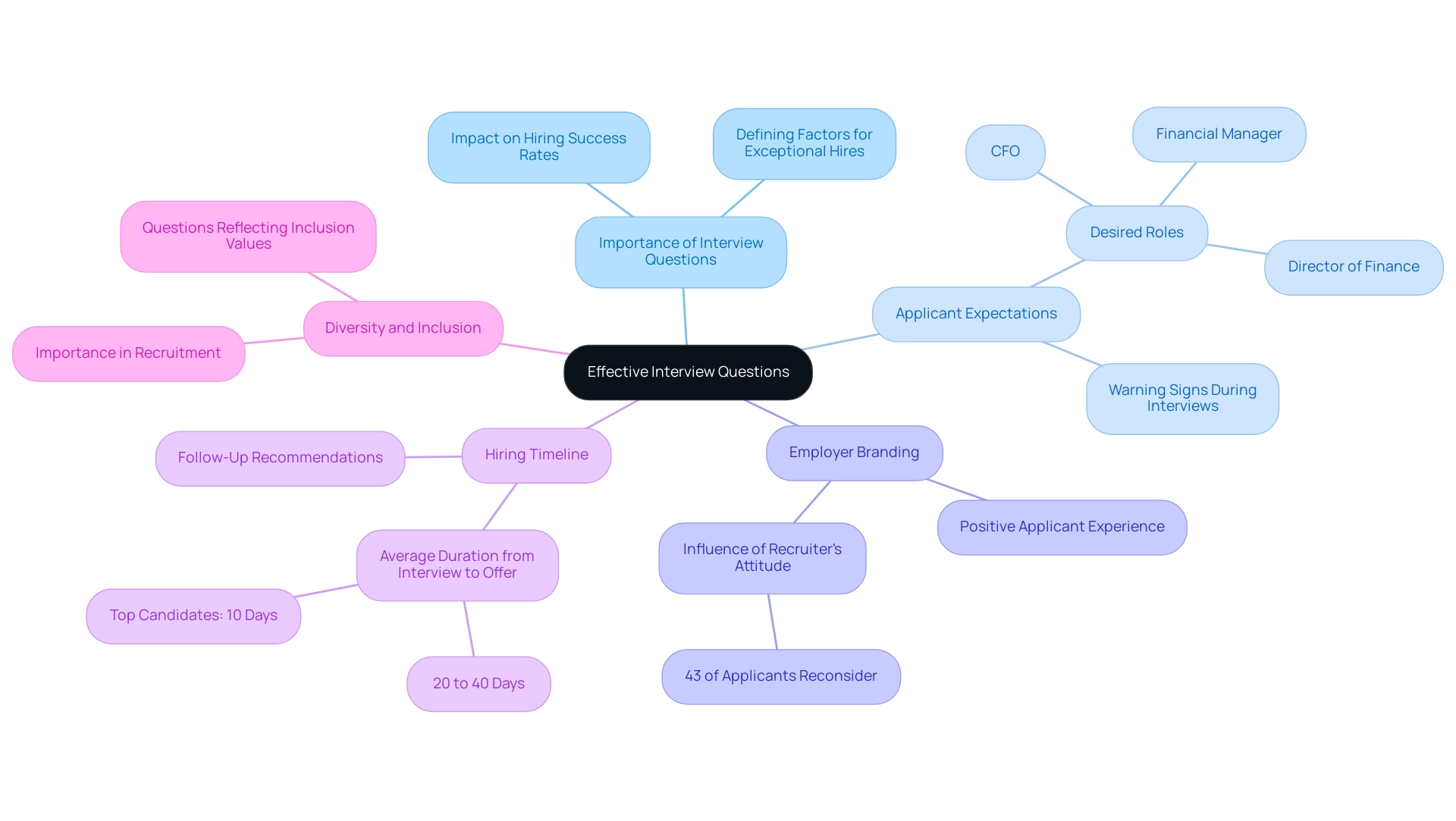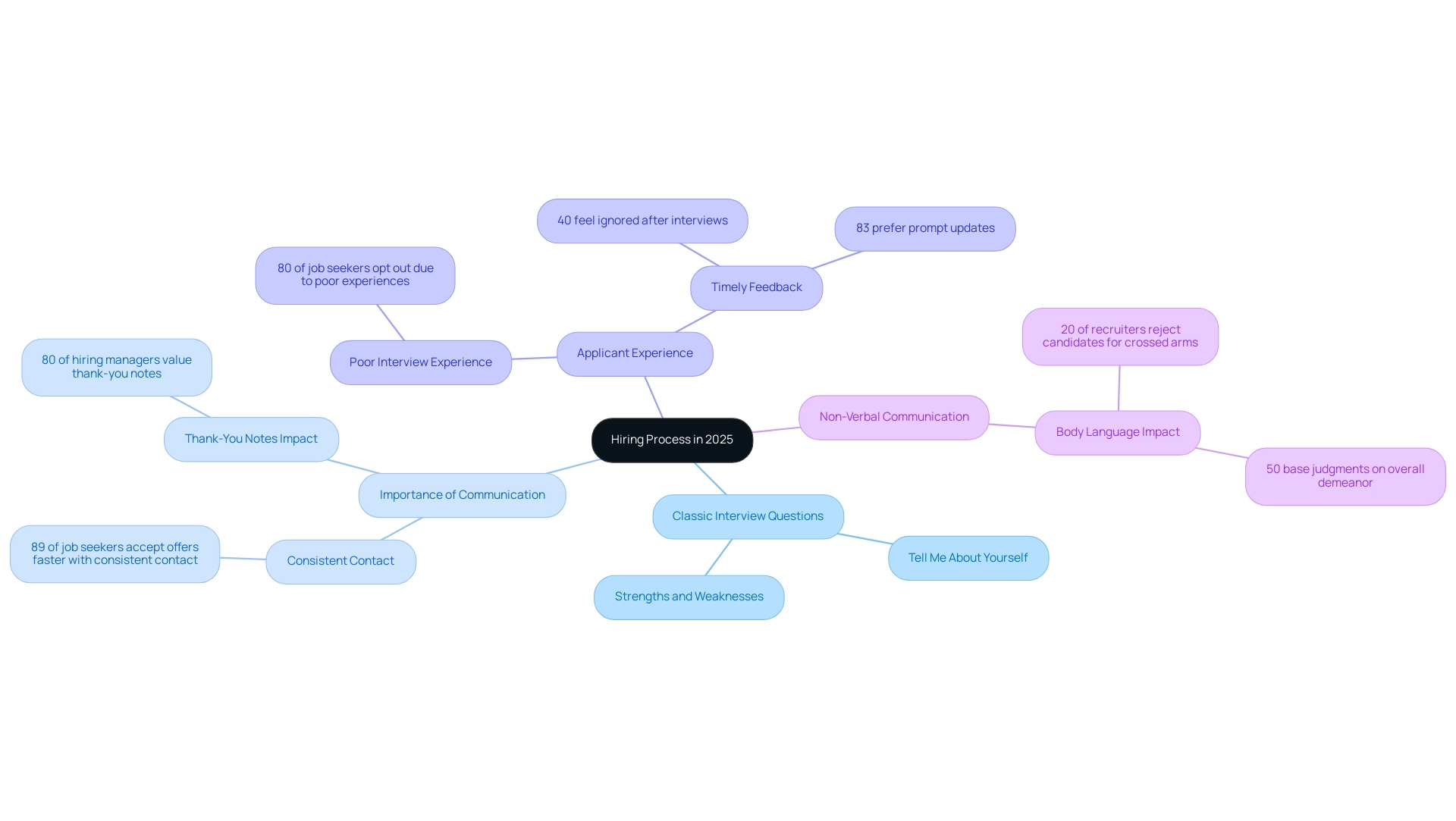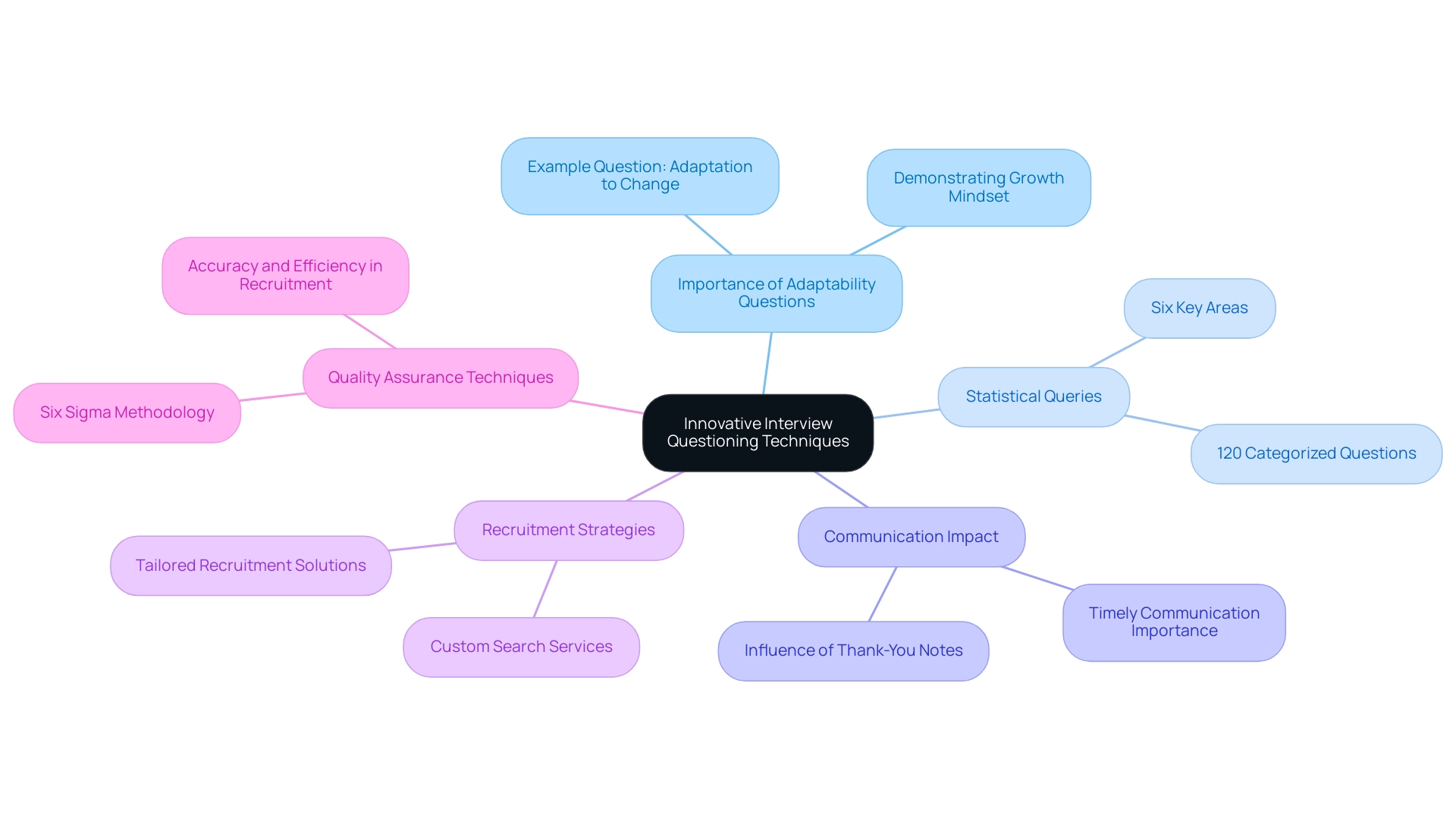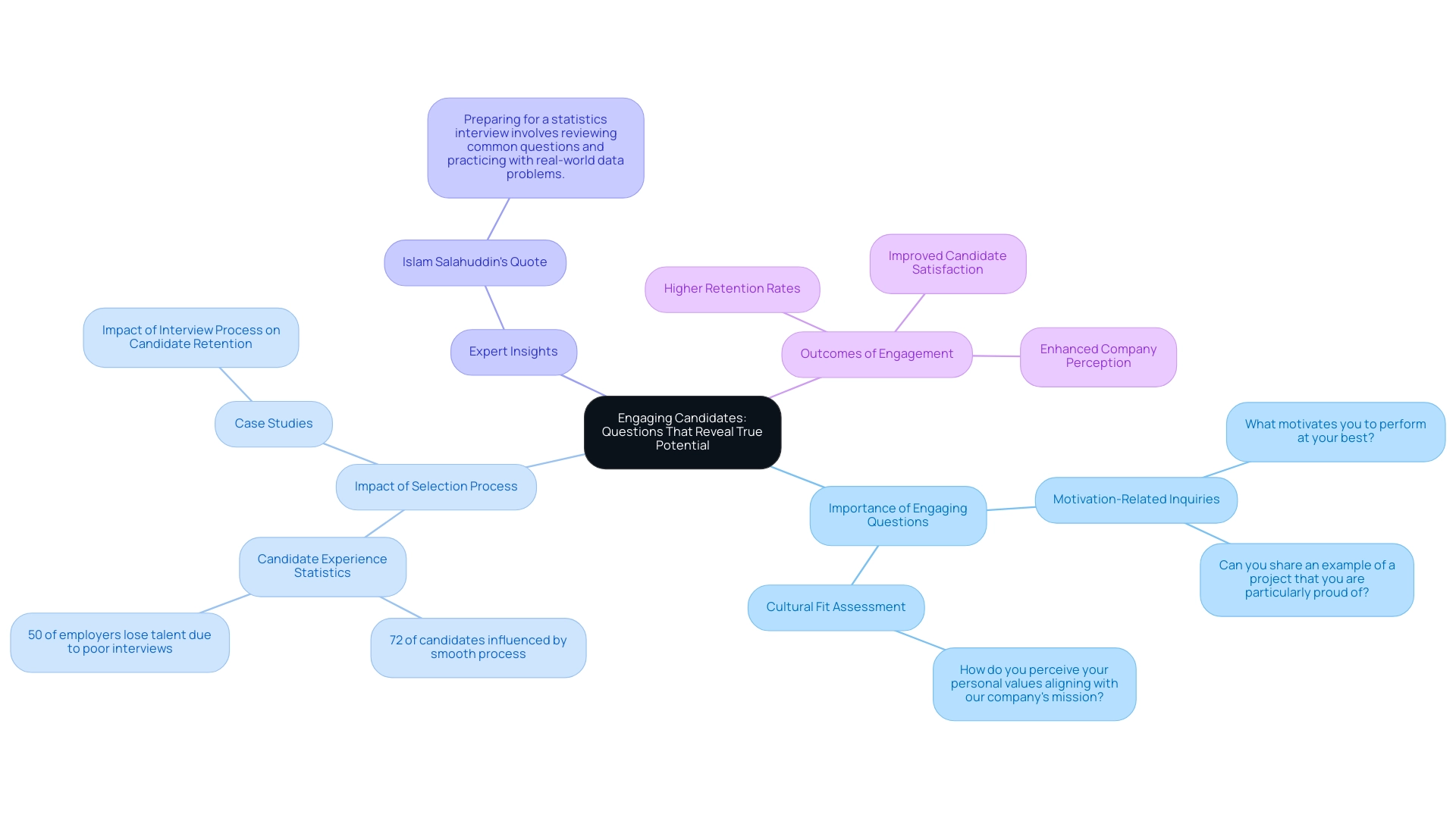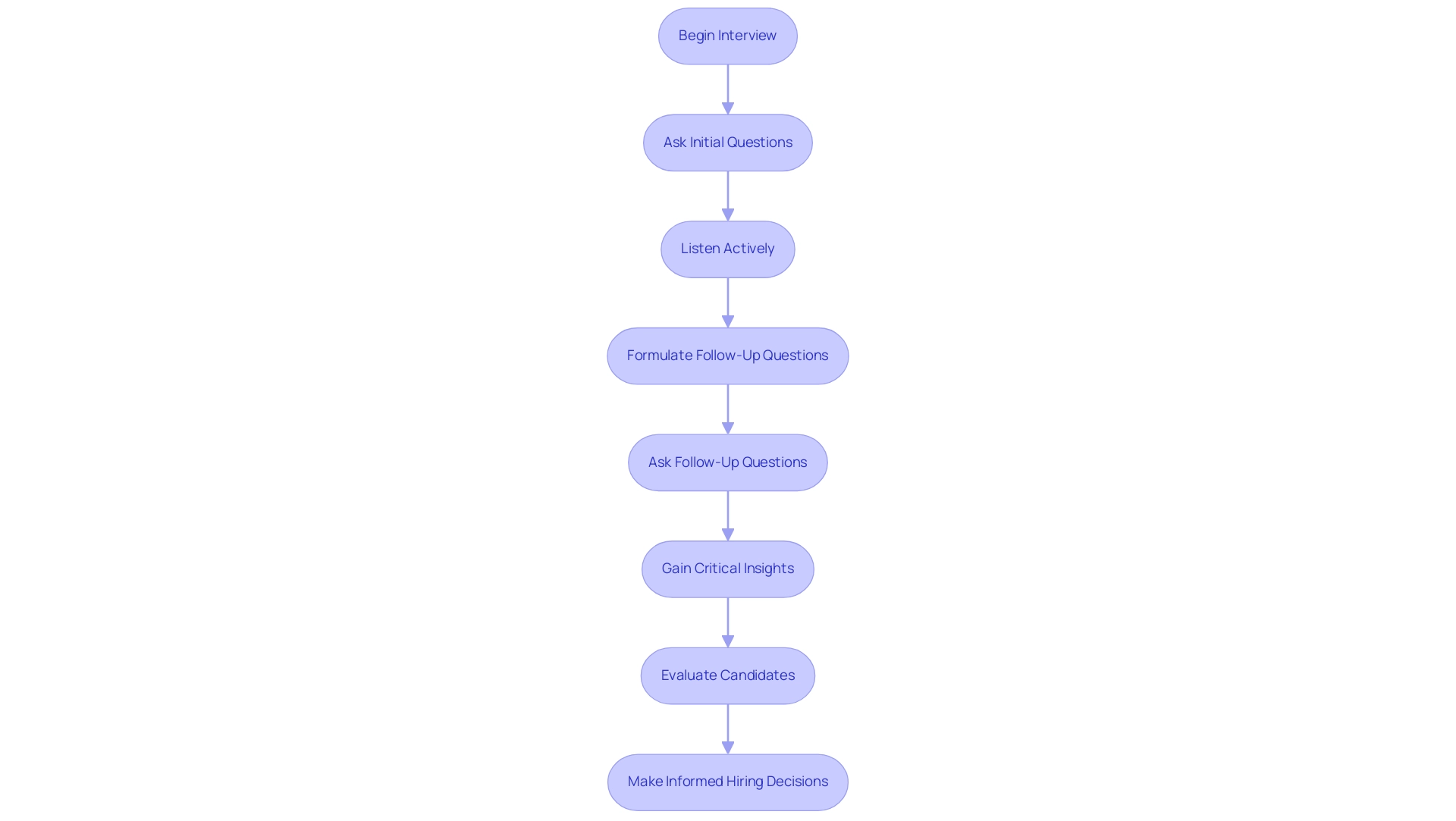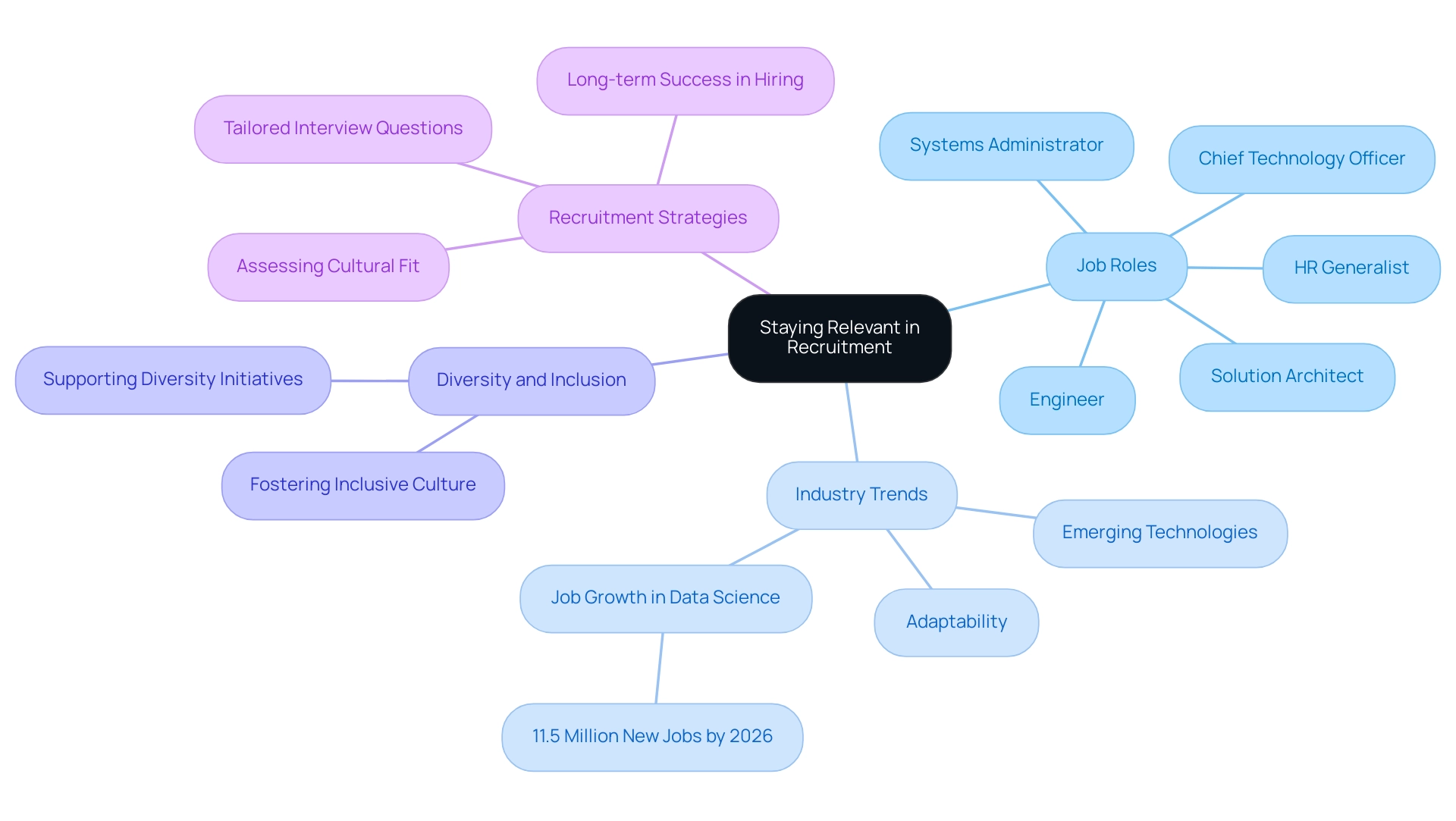Overview
The article underscores the critical necessity of balancing traditional and innovative interview questions to optimize the hiring process for employers. Effective questions not only forge a meaningful connection with candidates but also embody the organization’s values and its adaptability to evolving industry trends. This strategic approach ultimately enhances the applicant experience and boosts retention rates, a conclusion supported by compelling statistics on candidate preferences and hiring outcomes.
Key Highlights:
- Effective interview questions are crucial for establishing a connection between employers and applicants, especially in competitive job markets like finance.
- Top applicants seek roles that align with their skills and values, necessitating a smooth interview process to attract and retain talent.
- 43% of applicants may reconsider their application based on a recruiter’s attitude, emphasizing the importance of positive interactions.
- Classic questions like ‘Tell me about yourself’ remain essential for understanding an applicant’s background and motivations.
- 80% of hiring managers believe a thank-you note can influence their decision, highlighting the importance of communication during the hiring process.
- Candidates often decline job offers due to poor interview experiences, with 80% citing unsatisfactory meeting interactions.
- Innovative questions help assess candidates’ adaptability and growth mindset, especially for specialized roles.
- Follow-up inquiries can improve hiring choices by 30%, enhancing the quality of applicant evaluations.
- Engaging candidates with insightful questions can increase retention rates and overall satisfaction among new hires.
- Employers should align interview questions with current industry trends and challenges to identify informed and adaptable candidates.
Introduction
In the competitive job market of 2025, where millions of new roles in data science are emerging, the significance of effective interview questions cannot be overstated. As employers strive to attract top talent, particularly in high-demand sectors like finance and technology, the ability to ask insightful and engaging questions becomes a crucial differentiator.
Candidates today are not just looking for a job; they seek alignment with their skills, values, and aspirations. This article delves into the art of crafting impactful interview questions that not only enhance the hiring process but also foster a positive candidate experience, ultimately shaping an employer’s reputation in a fiercely competitive landscape.
From classic inquiries to innovative approaches that reflect industry trends, understanding how to engage candidates meaningfully is essential for organizations aiming to secure the best talent available.
The Significance of Effective Interview Questions
Effective interview prompts serve as vital questions for employers, establishing an essential link between them and applicants, while fostering a comprehensive understanding of shared expectations. In the competitive landscape of 2025, where an estimated 11.5 million new jobs in data science are anticipated—particularly within the financial sector—asking the right questions can be the defining factor in securing not just a good hire, but an exceptional one.
For HR managers in financial firms, it is crucial to recognize that top applicants, including roles such as CFO, Financial Manager, and Director of Finance, are not merely seeking any job; they are looking for positions that align with their skills and values. As intelligent and resourceful professionals evaluate prospective companies, they keenly observe for warning signs during discussions. Therefore, ensuring that hiring managers conduct conversations smoothly is essential to attract and retain these in-demand talents.
Employers who prioritize effective interview prompts are more likely to cultivate a positive applicant experience, thereby enhancing their employer brand. Jen Dewar emphasizes that 43% of applicants may reconsider their application based on a recruiter’s attitude, underscoring the importance of considerate interaction throughout the selection process.
Moreover, case studies illustrate that the duration from assessment to job offer typically ranges from 20 to 40 days, with top-tier individuals often receiving offers in as few as ten days. This highlights the crucial role that effective interview questions play in expediting the hiring process and improving overall success rates. By creating an environment where applicants feel valued and understood, organizations can not only attract top talent but also reinforce their reputation as preferred workplaces.
In 2025, the focus on diversity and inclusion in hiring further emphasizes the necessity for thoughtful interview prompts. With companies increasingly adopting initiatives that foster a fair and thriving work culture, it is essential for employers to consider questions that reflect these values. For instance, inquiring how individuals would contribute to a diverse team can provide insights into their commitment to inclusion.
Furthermore, for positions in financial companies that heavily rely on data-informed decision-making, preparation for discussions should encompass knowledge of common statistical inquiries and essential concepts. Ultimately, strategically employing effective inquiries not only enhances the applicant experience but also strengthens a company’s position in a fiercely competitive job market.
Classic Interview Questions: What to Ask and Why
Classic questioning techniques such as ‘Tell me about yourself’ and ‘What are your strengths and weaknesses?’ remain essential components of the hiring process in 2025. These inquiries serve as effective questions for employers, enabling them to gather vital information regarding an applicant’s background and motivations while also acting as a catalyst for deeper discussions.
They can reveal an applicant’s self-awareness and ability to reflect on their experiences—qualities that are crucial in any prospective employee. In a competitive talent landscape, where individuals are often exploring multiple job offers, it becomes imperative for hiring managers to craft a personalized and seamless selection experience. Recent findings indicate that 80% of hiring managers believe that receiving a thank-you note can influence their decision-making process. This underscores the importance of communication and impression management during assessments. Additionally, a staggering 89% of job seekers are more inclined to accept a job offer more quickly when a recruiter maintains consistent communication, demonstrating that engagement throughout the hiring process is vital for attracting top talent.
Moreover, regarding applicant experience, a notable 80% of job seekers have declined job offers due to unsatisfactory meeting experiences, as noted by Ryan Bradshaw. This statistic highlights the necessity for employers to approach discussions thoughtfully, ensuring that applicants feel valued and respected. Transparency and authenticity are paramount; individuals should be forthcoming about their workstyle preferences, including desired work arrangements—be it hybrid, remote, or on-site. This clarity aids hiring managers in comprehending applicants’ needs and expectations more effectively.
A case study on applicant communication revealed that 83% of individuals prefer prompt updates regarding their application status. However, 40% indicated feeling ignored after advancing to later stages of the selection process, which can tarnish a company’s reputation and deter future applicants. Providing timely responses to applicants, particularly those not selected, can foster a favorable perception of the organization and encourage recommendations. Furthermore, candidates are also evaluating the company throughout the selection process, determining if it aligns with their values and expectations.
The behavior of applicants during discussions significantly influences hiring decisions, with 20% of recruiters dismissing candidates for sitting with their arms crossed and 50% basing their judgments on overall demeanor. This illustrates the critical role of non-verbal communication during assessments, which can greatly impact perceptions of an individual’s suitability within a company.
Ultimately, while traditional assessment prompts may appear straightforward, they represent effective questions to ask in an interview as an employer. Their importance and efficacy in 2025 cannot be overstated. They not only provide insights into an applicant’s qualifications but also reflect the company’s commitment to a positive hiring experience, fostering a culture of respect and engagement that can lead to successful placements.
Innovative Approaches: Crafting Questions for the Modern Workplace
In today’s evolving work environment, asking the right questions during an interview is essential for employers seeking to differentiate candidates, particularly for specialized roles such as General Counsel, Financial Manager, or Chief Technology Officer. For example, inquiries like ‘Can you describe a time when you had to adapt to a significant change?’ prompt candidates to share concrete experiences that demonstrate their adaptability and growth mindset.
These strategic questions not only evaluate critical skills but also offer insights into how applicants confront challenges and learn from their experiences.
Statistics indicate that there are 120 categorized statistical queries across six key areas, underscoring the extensive range of innovative questioning techniques available to employers. By integrating these methods—especially tailored recruitment solutions from Boutique Recruiting for positions in the legal, finance, and technology sectors—organizations can cultivate a more dynamic interview environment that fosters open dialogue and deeper insights.
Moreover, case studies reveal the significant influence of timely communication, such as sending thank-you notes, on hiring decisions. A notable number of hiring managers report that receiving a thank-you note can positively affect their perceptions and decisions regarding applicants. This underscores the importance of not only asking the right questions but also maintaining effective communication throughout the hiring process, particularly within the competitive talent landscape. As Dan Lee, founder and ex-Google professional, asserts, ‘Innovative questioning techniques are essential for identifying candidates who can thrive in competitive environments.’ This perspective reinforces the necessity for organizations to adopt contemporary strategies in their hiring procedures, especially when navigating the talent battle for high-demand positions.
Furthermore, quality assurance techniques like Six Sigma emphasize accuracy and efficiency, which can be mirrored in the recruitment process. As the job market continues to evolve, staying informed about interview technology trends becomes imperative for those in hiring roles. This knowledge empowers them to formulate questions that effectively assess adaptability in candidates, ensuring they select individuals who are not only technically qualified but also capable of excelling in a modern workplace.
By focusing on innovative questioning methods and personalized recruitment strategies, including our custom search services tailored to your unique company needs, employers can significantly enhance their selection process. Contact Boutique Recruiting today for tailored recruitment solutions specific to your industry and location, ultimately leading to improved hiring outcomes.
Engaging Candidates: Questions That Reveal True Potential
Engaging applicants during interviews is crucial for uncovering their true potential and involves asking insightful questions to ensure a successful hiring process. Thought-provoking inquiries such as ‘What motivates you to perform at your best?’ and ‘Can you share an example of a project that you are particularly proud of?’ encourage applicants to articulate their passions and achievements. These questions not only illuminate a person’s work ethic but also provide valuable insights into how they might contribute to the organization’s success. Boutique Recruiting emphasizes personalized recruitment solutions that enhance applicant experiences, ensuring both participants and companies feel valued throughout the process.
Statistics reveal that 72% of candidates indicate that the smoothness of the selection process significantly influences their decision to accept a job offer. This underscores the necessity for organizations to foster an engaging atmosphere during the hiring process. Furthermore, research indicates that the interview stage is frequently the largest drop-off point in recruitment, with 50% of organizations losing quality talent due to a poor interview experience.
By incorporating insightful questions and promoting a supportive atmosphere, organizations can boost personnel retention and elevate their overall perception of the company. To evaluate alignment with company values, organizations can pose inquiries such as ‘How do you perceive your personal values aligning with our company’s mission?’ This not only measures an applicant’s fit within the organizational culture but also reveals their motivations and aspirations.
Expert insights suggest that effective questions to ask in an interview include motivation-related inquiries, which are pivotal in understanding what drives candidates and allowing employers to identify those who are not only qualified but also genuinely enthusiastic about contributing to the company’s goals. As Islam Salahuddin, a data consultant at The KPI Institute, observes, ‘Preparing for a statistics discussion involves reviewing common inquiry prompts, understanding key statistical concepts, and practicing with real-world data problems.’ Incorporating engaging questioning can significantly enhance hiring success.
Case studies indicate that organizations prioritizing applicant engagement during interviews experience higher retention rates and better overall satisfaction among new hires. Additionally, Boutique Recruiting’s structured inquiry process for candidates and hiring managers ensures a comprehensive evaluation of potential hires, tailored to high-demand roles such as CFOs and IT professionals. Boutique Recruiting’s impressive track record of success and numerous satisfied clients underscore its reputation as a trusted recruiting partner.
By concentrating on these strategies and providing comprehensive employee benefits, organizations can ensure they attract and retain top talent who are aligned with their values and motivated to excel.
The Art of Follow-Up: Deepening the Conversation
Mastering the art of follow-up inquiries is essential in the interview process, particularly for employers in Boutique Recruiting, a leader in sourcing high-quality marketing and operational talent across diverse industries, including roles such as Chief of Staff, Executive Assistant, and Customer Service Representative. This technique enables employers to formulate effective questions, allowing them to delve deeper into applicants’ responses and revealing critical insights about their problem-solving skills and cognitive processes. For instance, when an applicant discusses a challenging project, a follow-up question like, ‘What specific strategies did you use to overcome those challenges?’ can provide valuable insights.
In 2025, statistics indicate that effective follow-up inquiries significantly enhance the quality of applicant evaluations. Studies demonstrate that discussions utilizing these methods result in a 30% increase in precise hiring choices. This is vital in a competitive job market, especially as 11.5 million new positions in data science are anticipated by 2026, underscoring the necessity for accurate applicant evaluation.
Furthermore, active listening plays a crucial role in recruitment. Information suggests that organizations practicing active listening during interviews are 40% more likely to formulate effective questions, enabling them to identify individuals who align with their organizational culture. This approach reflects a genuine interest from the employer and fosters an environment where applicants feel encouraged to elaborate on their experiences, ultimately leading to a more dynamic and informative conversation.
Case studies from 2025 highlight the transformative effect of follow-up inquiries on applicant evaluation. Organizations that implemented structured follow-up questioning reported a 25% improvement in applicant satisfaction and a notable increase in retention rates of new hires. These findings emphasize the significance of formulating effective questions during interviews, as they contribute to a thorough understanding of applicants, ultimately resulting in improved hiring outcomes.
The SmartRecruiters 2024 Talent Acquisition Survey underscores the pressing need for organizations to reassess their talent acquisition strategies, indicating that AI-driven solutions can enhance recruitment processes. This contemporary context aligns with the importance of follow-up inquiries, as they can be integrated into AI-powered systems to further refine applicant assessments.
Expert opinions reinforce this perspective, asserting that enriching discussions with follow-up prompts enhances the interview experience and promotes a culture of diversity and inclusion, ensuring all applicants have an equal opportunity to showcase their qualifications. Eric Eddy’s insights regarding Boutique Recruiting‘s capability to deliver top-tier candidates swiftly and effectively highlight the benefits of incorporating thoughtful follow-up inquiries into the hiring process. By prioritizing effective questions during interviews, organizations can significantly enhance their recruitment processes and make more informed hiring decisions, particularly in navigating the competitive talent landscape, benefiting from the impressive track record of success that Boutique Recruiting has established as a trusted recruiting partner.
Staying Relevant: Questions Addressing Industry Trends and Challenges
In today’s dynamic job market, employers must prioritize insightful questions during interviews that align with current industry trends and challenges, especially in technical and HR roles such as:
- Chief Technology Officer
- Engineer
- Solution Architect
- Systems Administrator
- HR Generalist
Boutique Recruiting recognizes that conducting custom searches tailored to specific company needs is crucial for navigating the competitive talent landscape. By inquiring about how candidates stay informed on industry developments or their perspectives on the most significant challenges facing the sector, employers can gain valuable insights into candidates’ engagement and proactive stance on professional growth.
Consider this: with an anticipated 11.5 million new positions in data science by 2026, understanding candidates’ familiarity with emerging technologies and methodologies is vital. Integrating such pertinent inquiries into the interview process not only helps identify informed individuals but also those who possess the adaptability necessary to thrive in a complex environment. A compelling case study highlighting the shift towards diversity and inclusion underscores this point; companies are increasingly acknowledging the importance of cultivating an inclusive culture, which necessitates individuals who can contribute to and enhance that environment.
This trend underscores the necessity for organizations to assess candidates’ capacity to support diversity initiatives and foster an inclusive workplace. Furthermore, staying informed about recruitment trends is essential. As the landscape evolves, so too must the strategies employed by recruiters.
Employers can ensure they are selecting individuals who not only meet technical qualifications but also align with the organizational culture and values by asking the right questions during interviews. Dan Lee, founder of Data Interview, emphasizes the significance of this approach, asserting that asking insightful questions can profoundly impact the quality of hires. This strategy not only enhances the quality of hires but also fortifies the overall recruitment process, laying the groundwork for long-term success.
Boutique Recruiting’s impressive track record, characterized by numerous satisfied clients and candidates, further reinforces the effectiveness of this tailored approach to recruitment. For more information on how Boutique Recruiting can assist you with custom searches tailored to your unique needs, please contact us.
Conclusion
In the evolving job market of 2025, the significance of effective interview questions is paramount. They serve as a crucial link between employers and candidates, fostering a deeper understanding of mutual expectations. By employing insightful and engaging questions, organizations can not only attract top talent but also enhance their employer brand and candidate experience. This is particularly vital in high-demand sectors like finance and technology, where candidates are discerning and seek alignment with their skills and values.
Classic and innovative interview questions play a pivotal role in unveiling a candidate’s true potential. Traditional inquiries provide essential insights into candidates’ backgrounds, while modern approaches encourage deeper discussions that showcase adaptability and problem-solving skills. Engaging candidates with thought-provoking questions cultivates a positive interview atmosphere, ultimately influencing their decision to accept job offers. Moreover, the art of follow-up questions enriches conversations, enabling employers to assess candidates more accurately and build a rapport that reflects organizational culture.
As the landscape continues to evolve, remaining relevant by addressing industry trends and challenges is crucial. Employers must craft questions that evaluate not only technical qualifications but also gauge candidates’ commitment to diversity and inclusion. By prioritizing effective communication and personalized recruitment strategies, organizations can adeptly navigate the competitive talent landscape. In summary, the ability to ask meaningful questions is essential for fostering a positive hiring experience, attracting high-quality talent, and establishing a reputable presence in the market. As companies adapt to the dynamic nature of recruitment, leveraging these strategies will be key to securing the best candidates for the future.
Frequently Asked Questions
Why are effective interview prompts important for employers?
Effective interview prompts help establish a connection between employers and applicants, fostering a comprehensive understanding of shared expectations and enhancing the applicant experience.
What job market trends are anticipated in 2025 that affect hiring practices?
In 2025, there is an expected increase of 11.5 million new jobs in data science, particularly in the financial sector, making the right interview questions crucial for securing exceptional hires.
What should HR managers in financial firms consider when interviewing top applicants?
HR managers should recognize that top applicants seek positions that align with their skills and values, and they observe for warning signs during interviews, making smooth conversations essential.
How does the attitude of recruiters impact applicants’ decisions?
A significant 43% of applicants may reconsider their application based on a recruiter’s attitude, highlighting the importance of considerate interactions throughout the selection process.
What is the typical duration from assessment to job offer?
The duration from assessment to job offer usually ranges from 20 to 40 days, with top-tier candidates often receiving offers in as few as ten days.
How does focusing on diversity and inclusion influence interview questions?
Employers should consider questions that reflect diversity and inclusion values, such as asking how candidates would contribute to a diverse team, emphasizing the importance of a fair work culture.
What classic questioning techniques remain essential in the hiring process?
Classic questions like ‘Tell me about yourself’ and ‘What are your strengths and weaknesses?’ are vital as they provide insights into an applicant’s background and motivations.
How does communication affect the hiring decision?
80% of hiring managers believe that receiving a thank-you note can influence their decision, and 89% of job seekers prefer consistent communication from recruiters throughout the hiring process.
What impact does the applicant’s experience during the interview have on their decision to accept a job offer?
80% of job seekers have declined job offers due to unsatisfactory meeting experiences, indicating that thoughtful discussions are necessary to ensure applicants feel valued.
How does non-verbal communication affect hiring decisions?
Non-verbal communication significantly influences hiring decisions, with 20% of recruiters dismissing candidates based on body language and 50% basing judgments on overall demeanor.
What is the significance of traditional assessment prompts in 2025?
Traditional assessment prompts are effective in providing insights into an applicant’s qualifications and reflect a company’s commitment to a positive hiring experience, fostering respect and engagement.
